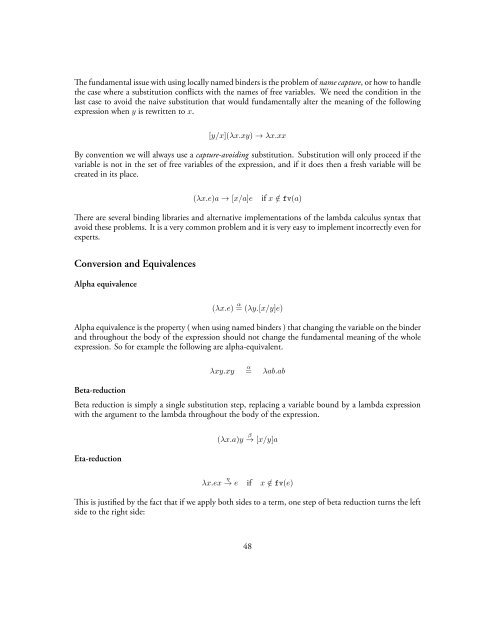Create successful ePaper yourself
Turn your PDF publications into a flip-book with our unique Google optimized e-Paper software.
e fundamental issue with using locally named binders is the problem of name capture, or how to handle<br />
the case where a substitution conflicts with the names of free variables. We need the condition in the<br />
last case to avoid the naive substitution that would fundamentally alter the meaning of the following<br />
expression when y is rewritten to x.<br />
[y/x](λx.xy) → λx.xx<br />
By convention we will always use a capture-avoiding substitution. Substitution will only proceed if the<br />
variable is not in the set of free variables of the expression, and if it does then a fresh variable will be<br />
created in its place.<br />
(λx.e)a → [x/a]e<br />
if x /∈ fv(a)<br />
ere are several binding libraries and alternative implementations of the lambda calculus syntax that<br />
avoid these problems. It is a very common problem and it is very easy to implement incorrectly even for<br />
experts.<br />
Conversion and Equivalences<br />
Alpha equivalence<br />
(λx.e) α = (λy.[x/y]e)<br />
Alpha equivalence is the property ( when using named binders ) that changing the variable on the binder<br />
and throughout the body of the expression should not change the fundamental meaning of the whole<br />
expression. So for example the following are alpha-equivalent.<br />
λxy.xy<br />
α<br />
= λab.ab<br />
Beta-reduction<br />
Beta reduction is simply a single substitution step, replacing a variable bound by a lambda expression<br />
with the argument to the lambda throughout the body of the expression.<br />
Eta-reduction<br />
(λx.a)y β → [x/y]a<br />
λx.ex η → e if x /∈ fv(e)<br />
is is justified by the fact that if we apply both sides to a term, one step of beta reduction turns the left<br />
side to the right side:<br />
48


